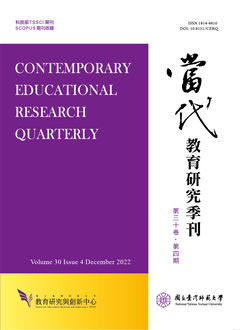

研究目的
華人父母的教養深受儒家思想影響,特別是強調與道德倫理及行為規範相關的「恥感教養(shaming)」,乃華人父母以「使子女感到羞恥」做為引導子女為其行為負責、培養子女自省能力,協助子女社會化的重要技巧之一。「恥感(shame)」屬於自我意識情緒(self-conscious emotions)之一,指個體關注於他人對自己的負面評價,意識到自我的失敗和侷限,並對此感到不滿及自我譴責的情緒感受。隨著認知能力發展,三歲幼兒開始能夠理解外在規範、標準與他人的觀點,並具備依據外界規則來評價自己行為的能力,發展出恥感等具有自我評價意涵的自我意識情緒。本研究聚焦於三歲幼兒的恥感進行探討,研究目的為了解臺灣三歲幼兒父母之恥感教養、幼兒恥感與其社會行為間的關聯,並探討幼兒性別在父母恥感教養與幼兒恥感間的調節作用,以及幼兒恥感在父母恥感教養與幼兒社會行為間的中介作用。
研究設計/方法/取徑
本研究使用「臺灣幼兒發展資料庫」36 月齡組第一波資料進行分析,篩選受訪者為幼兒親生父母且為本國國籍者,並排除重大傷病或身心障礙之幼兒後,得研究樣本計1,873 筆資料(父親計312 人、母親計1,561 人;男童947 人、女童926 人)。本研究使用R 軟體進行資料分析,以Spearman 等級相關計算兩兩變項間之相關係數,以Wilcoxon 檢定探討相依樣本的差異性,最後以lavaan 套件分析線性結構方程模型,並以Bollen-Stine bootstrap 重複5,000 次來呈現穩健的研究結果,及以95% 信賴區間(confidence interval, CI)作為效果是否顯著的判斷基準。
研究發現或結論
分析結果顯示:本研究假設模型具有可接受的整體適配度。主要結果有四:(一)父母恥感教養與三歲幼兒恥感達顯著正相關。(二)父母恥感教養與三歲幼兒恥感的關聯受到幼兒性別的調節作用。(三)幼兒恥感與其合群、順從與退縮之社會行為達顯著關聯。(四)父母恥感教養會透過幼兒恥感影響其合群、順從與退縮等社會行為,但此中介效果僅發生在女童。
研究原創性/價值
本研究透過結構方程模型分析臺灣父母恥感教養、三歲幼兒恥感以及幼兒社會行為間的關聯,呈現華人恥感教養的影響效應。
教育政策建議或實務意涵
本研究建議親職教育工作者,可引導育幼父母了解幼兒社會化的發展歷程,給予年幼子女學習人際互動時合適的教養策略,幫助幼兒內化社會規範的能力,建立合宜之行為界線。
Purpose
With the belief of shame in Confucianism, most ethnically Chinese parents teach their children by shaming practices, which guides their children’s behavior, and helps them to build the ability of self-disciplining with a feeling of shame. Shame is one of the self-conscious emotions. A feeling of shame helps individuals pay close attention to others’ negative comments, and to realize one’s failures and limitations, thus enabling them to express the emotions of indignation and self-criticism. Three-year-old children gradually become able to perceive social norms, common standards, and others’ perspectives, and to possess the ability to evaluate their behaviors. This study focuses on shame among three-year-old children. The objectives of this study were to identify the relationships among parental shaming, three-year-old children’s shame, and the children’s social behaviors; and the mediating effect of children’s shame in the relationship between parental shaming and children’s social behaviors.
Design/methodology/approach
This study used data on 36-month-old children collected from Kids in Taiwan (KIT): National Longitudinal Study of Child Development and Care, and recruited biological parents of children included in the data as the study sample; only those who held Taiwanese nationality were enrolled in the sample. This study finalized the sample at 1,873 participants (including 312 fathers, 1,561 mothers, 947 boys, and 926 girls). To conduct the data analysis, we used the R software for Windows, calculated the correlation between each pair of variables by using Spearman’s rank correlation, and used the Wilcoxon test to explore the differences between dependent samples. Finally, the lavvan package was implemented to analyze the linear structural equation model, with the Bollen-Stine bootstrap repeated 5000 times to obtain robust results. Moreover, a 95% confidence interval (CI) was used to serve as the criterion for judging whether the effect was significant.
Findings/results
The results of the hypothetical model had an acceptable fit. The study’s main findings are as follows: Parental shaming was found to be significantly and positively correlated with three-year-old children’s shame. Parental shaming was able to predict the three-year-old children’s shame and was moderated by children’s gender. In particular, the influence of parental shaming shows more effects among girls. The study result proves that when parents use shaming more, girls have a higher probability of feeling shame.
Additionally, regarding the association between children’s shame and their social behaviors, children’s shame was significantly and positively correlated with the behaviors of cooperation, compliance, and withdrawal. Finally, the mediating effect test showed that stronger parental shaming was associated with a higher level of children’s shame, which in turn resulted in more social behaviors (i.e., cooperation, compliance, and withdrawal), but this phenomenon only happened among girls.
Originality/value
This study analyzed the sample with a structural equation model, delving into the relationships among parental shaming, children’s shame, and children’s social behaviors, demonstrating the influence of ethnically Chinese parental shaming.
Implications for policy/practice
Based on the results of the analysis, this study recommends that parenting educators could guide the parents of young children to understand the developmental process of socialization, equipping them with proper parenting strategies for children to learn how to build interpersonal relationships with others. This will help young children internalize the capacity of adapting to society, and establish fitting boundaries for young children’s behavior.

本著作係採用創用 CC 姓名標示-非商業性 3.0 台灣 授權條款授權.
本刊國立台灣師範大學教育研究與創新中心
106台北市和平東路一段162號 | 電話: 02-7749-3670 | E-mail: cerecerq@gmail.com
教創中心 | 師大 | 電子報 | 線上投審系統
本刊由國家科學及技術委員會人文社會科學研究中心補助經費
© 2014 CERI-NTNU
